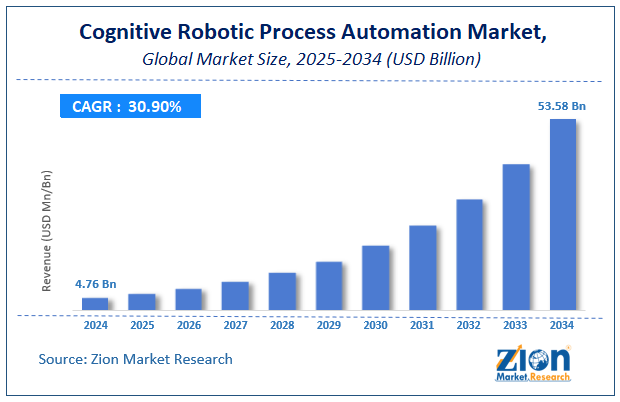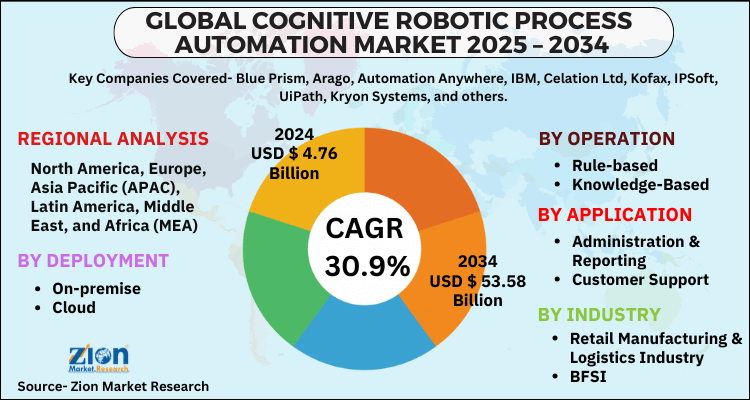Global Cognitive Robotic Process Automation Market Size, Share, Growth Analysis Report - Forecast 2034

Cognitive Robotic Process Automation Market By Deployment (On-Premises, Cloud), By Operation (Rule-Based, Knowledge-Based), Application (Administration & Reporting, Customer Support, Data Migration & Capture Extraction, Analysis, Others), Industry (Retail, Manufacturing & Logistics Industry, BFSI, Healthcare, IT & Telecom, Hospitality, Others), and By Region: Global and Regional Industry Overview, Market Intelligence, Comprehensive Analysis, Historical Data, and Forecasts 2025 - 2034
| Market Size in 2024 | Market Forecast in 2034 | CAGR (in %) | Base Year |
|---|---|---|---|
| USD 4.76 Billion | USD 53.58 Billion | 30.9% | 2024 |
Cognitive Robotic Process Automation Market: Industry Perspective
The global cognitive robotic process automation market size was worth around USD 4.76 Billion in 2024 and is predicted to grow to around USD 53.58 Billion by 2034 with a compound annual growth rate (CAGR) of roughly 30.9% between 2025 and 2034. The report analyzes the global cognitive robotic process automation market's drivers, restraints/challenges, and the effect they have on the demands during the projection period. In addition, the report explores emerging opportunities in the cognitive robotic process automation industry.
Cognitive Robotic Process Automation Market: Overview
Cognitive RPA refers to Robotic Process Automation (RPA) solutions and tools that use AI technologies like text analytics, optical character recognition, and machine learning to enhance the experience of both employees and consumers. This advanced sort of RPA gets its name from the way it mimics human gestures as individuals do various tasks inside a process.
Learning (the acquisition of information and the application of contextual standards), logic (the use of context and rules to deduce conclusions), and self-correction are aspects of such systems.
Cognitive Robotic Process Automation Market: Growth Drivers
Rapid adoption of automation technologies in the various end-use sector is likely to boost market growth.
The market is expected to increase due to the increasing usage of the digital workforce and automation technologies in various sectors. Automation technology is widely used in industries to improve their businesses and enhance everyday operations by boosting efficiency and lowering costs, which fuels market growth.
For example, in the BFSI industry, cognitive process automation has been widely adopted to improve customer service skills and staff engagement activities. This technology aids telecom and IT organizations in lowering manual labor, information systems, and business operations, which ultimately supports market growth.
Cognitive Robotic Process Automation Market: Restraints
High initial investment associated with cognitive robotic process automation may hinder market growth.
Industry adoption of cognitive process automation technologies necessitates a significant upfront investment, and the tools necessitate highly experienced personnel & data scientists. This stifles the market for cognitive process automation. Furthermore, cognitive automation tool licensing prices are substantially greater than task-level automation tool licensing costs.
The return on investment (ROI) is very poor, which is expected to limit market expansion. Because of the time necessary to explain the business case, find, and onboard new tools, this automation might take months to execute in industries. This is expected to stifle global cognitive robotic process automation market expansion.
Cognitive Robotic Process Automation Market: Opportunities
Increasing preferences to automate the complex task is likely to offer better growth opportunities to the market.
Automation based on structured data is supported by conventional RPA. Cognitive RPA goes even further by allowing businesses to automate operations including unstructured data sources such as emails, scanned documents, letters, and voice recordings. The true value of cognitive automation is that it allows businesses to automate operations that are more sophisticated and less rule-based. Unlike traditional unattended RPA, cognitive RPA can handle exceptions without the need for human intervention.
Most RPA systems, for example, are unable to deal with issues such as a date entered incorrectly, insufficient information in a form, or slow network or Internet reaction times. Many firms are implementing cognitive robotic process automation because unmonitored RPA would generally pass the process to a human operator in such a situation.
Cognitive Robotic Process Automation Market: Challenges
Shortage of skilled resources and lack of required support from businesses pose a major challenge to market growth.
With the rise in today's market requirements, RPA is flourishing, yet competent personnel is scarce in the RPA industry. Obtaining resources while launching a new project and backfilling a critical resource in the event of attrition are both significant risks to any project's success. RPA experts with vast expertise also anticipate hefty contracts, which may not be financially feasible for some businesses.
The business must be equipped with the proper workflow schematics, potential workarounds for possible failure situations, business rules for different types of data to be processed by the Bot, and technological exclusions confronted by the operations department during manual processing for an RPA project to be successful.
Cognitive Robotic Process Automation Market: Segmentation
Cognitive Robotic Process Automation Market: Segmentation Analysis
The global cognitive robotic process automation market is segmented based on Deployment, Operation, Application, Industry, and region.
Based on Deployment, the global cognitive robotic process automation market is divided into On-Premises, Cloud.
On the basis of Operation, the global cognitive robotic process automation market is bifurcated into Rule-Based, Knowledge-Based.
By Application, the global cognitive robotic process automation market is split into Administration & Reporting, Customer Support, Data Migration & Capture Extraction, Analysis, Others.
In terms of Industry, the global cognitive robotic process automation market is categorized into Retail, Manufacturing & Logistics Industry, BFSI, Healthcare, IT & Telecom, Hospitality, Others.
Cognitive Robotic Process Automation Market: Report Scope
| Report Attributes | Report Details |
|---|---|
| Report Name | Cognitive Robotic Process Automation Market |
| Market Size in 2024 | USD 4.76 Billion |
| Market Forecast in 2034 | USD 53.58 Billion |
| Growth Rate | CAGR of 30.9% |
| Number of Pages | 167 |
| Key Companies Covered | Blue Prism, Arago, Automation Anywhere, IBM, Celation Ltd, Kofax, IPSoft, UiPath, Kryon Systems, and others. |
| Segments Covered | By Deployment, By Operation, By Application, By Industry, and By Region |
| Regions Covered | North America, Europe, Asia Pacific (APAC), Latin America, The Middle East and Africa (MEA) |
| Base Year | 2024 |
| Historical Year | 2020 to 2023 |
| Forecast Year | 2025 - 2034 |
| Customization Scope | Avail customized purchase options to meet your exact research needs. Request For Customization |
Cognitive Robotic Process Automation Market: Regional Landscape
North America is projected to lead the global market over the forecast period.
North America is expected to lead and keep a large proportion of the global cognitive robotic process automation market during the forecast period. The region's strong growth can be attributed to the United States' rising participation. Furthermore, the increased adoption of modern technologies and the presence of several companies are expected to propel the North American market forward in the approaching years.
On the other end, the emerging economies in the Asia Pacific sector are expected to increase positively in the next years. Throughout the forecast period, the market is expected to benefit from the increased use of cognitive robotic process automation in China and India, as well as the expansion of the IT industry in emerging nations.
Recent Developments
- In January 2021, Nice System Ltd. introduced artificial intelligence-based robotic process automation tools to assist companies in taking advantage of automation possibilities more quickly. This enables firms to enhance organizational resilience, increase efficiency, and swiftly extend current process automation, even in the face of changing market conditions.
- In Nov 2020, Pegasystems, Inc. has announced the release of Pega Auto-balancing, a digital transformation platform. Artificial intelligence is used in the new approach to optimize the bot's task management without the need for human interaction.
Cognitive Robotic Process Automation Market: Competitive Analysis
The report provides a company market share analysis to give a broader overview of the key market players. In addition, the report also covers key strategic developments of the market, including acquisitions & mergers, new product launches, agreements, partnerships, collaborations & joint ventures, research & development, and regional expansion of major participants involved in the cognitive robotic process automation market on a global and regional basis.
The global cognitive robotic process automation market is dominated by players like:
- Blue Prism
- Arago
- Automation Anywhere
- IBM
- Celation Ltd
- Kofax
- IPSoft
- UiPath
- Kryon Systems
The global cognitive robotic process automation market is segmented as follows:
By Deployment
- On-premise
- Cloud
By Operation
- Rule-based
- Knowledge-Based
By Application
- Administration & Reporting
- Customer Support
- Data Migration & Capture Extraction
- Analysis
- Others
By Industry
- Retail Manufacturing & Logistics Industry
- BFSI
- Healthcare
- IT and Telecom
- Hospitality
- Others
By Region
- North America
- The U.S.
- Canada
- Europe
- France
- The UK
- Spain
- Germany
- Italy
- Rest of Europe
- Asia Pacific
- China
- Japan
- India
- South Korea
- Southeast Asia
- Rest of Asia Pacific
- Latin America
- Brazil
- Mexico
- Rest of Latin America
- Middle East & Africa
- GCC
- South Africa
- Rest of Middle East & Africa
Table Of Content
Methodology
FrequentlyAsked Questions
Cognitive RPA refers to Robotic Process Automation (RPA) solutions and tools that use AI technologies like text analytics, optical character recognition, and machine learning to enhance the experience of both employees and consumers.
The global cognitive robotic process automation market is expected to grow due to rising adoption in business process optimization, increasing demand for AI-driven automation, advancements in machine learning and NLP, and growing focus on improving operational efficiency.
According to a study, the global cognitive robotic process automation market size was worth around USD 4.76 Billion in 2024 and is expected to reach USD 53.58 Billion by 2034.
The global cognitive robotic process automation market is expected to grow at a CAGR of 30.9% during the forecast period.
North America is expected to dominate the cognitive robotic process automation market over the forecast period.
Leading players in the global cognitive robotic process automation market include Blue Prism, Arago, Automation Anywhere, IBM, Celation Ltd, Kofax, IPSoft, UiPath, Kryon Systems, among others.
The report explores crucial aspects of the cognitive robotic process automation market, including a detailed discussion of existing growth factors and restraints, while also examining future growth opportunities and challenges that impact the market.
RelatedNews
HappyClients
Zion Market Research
Tel: +1 (302) 444-0166
USA/Canada Toll Free No.+1 (855) 465-4651
3rd Floor,
Mrunal Paradise, Opp Maharaja Hotel,
Pimple Gurav, Pune 411061,
Maharashtra, India
Phone No +91 7768 006 007, +91 7768 006 008
US OFFICE NO +1 (302) 444-0166
US/CAN TOLL FREE +1 (855) 465-4651
Email: sales@zionmarketresearch.com
We have secured system to process your transaction.
Our support available to help you 24 hours a day, five days a week.
Monday - Friday: 9AM - 6PM
Saturday - Sunday: Closed






